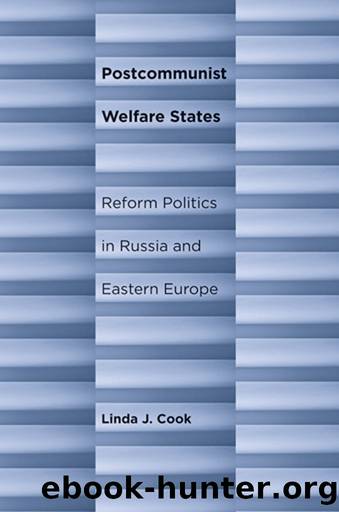Postcommunist Welfare States by Linda J. Cook

Author:Linda J. Cook [Cook, Linda J.]
Language: eng
Format: epub
Tags: History, Russia & the Former Soviet Union, Political Science, American Government, National, Public Policy, Social Services & Welfare
ISBN: 9780801460098
Google: NWh5DwAAQBAJ
Publisher: Cornell University Press
Published: 2013-07-02T01:10:44+00:00
STAGES OF RESTRUCTURING IN RUSSIA
Table 3.1 summarizes domestic political balances during this period and their effects on welfare state change in Russia. It shows that pro-reform institutions and actorsâthe executive, reformist social-sector elites, and policy specialists and liberal international institutionsâwere weakened in 1994â1999, whereas the antireform Duma and state-bureaucratic stakeholders vetoed changes in the welfare state. The consequences across policy areas are summarized in table 3.5, which shows the effectsâstalled pension and housing reforms, dilution of earlier liberalizing changes in health and education, and increasing social privileges. The table also contrasts policy outcomes in this period with those of the initial liberalization in 1991â1993 and with the following period of renewed liberalization under Putin.
The outcome of this period was an incoherent policy of retrenchment without restructuring that had three major effects on the welfare state: (1) the inherited system of basic social guarantees remained in place while benefit payments and social-sector wages fell and were chronically in arrears; (2) the redirection of welfare spending from inherited patterns was minimal and the system largely failed to address transition-induced poverty and unemployment; (3) the collapse of state financing combined with the absence of formal privatization or effective regulation to produce pervasive informality, spontaneous privatization, and corruption in Russiaâs social sector.
At the beginning of 2000 the newly elected Duma surveyed social conditions in Russia in the aftermath of the 1998 financial crisis that had brought about the collapse of the ruble and pushed social indicators to their lowest levels in the transition. Fifty million people, more than one-third of the population, were poor; 10 million were unemployed. All basic social guarantees had fallen below the subsistence level. The Law on Veterans was fully funded in fewer than one-quarter of Russiaâs regions.94 All state social-sector payments had significant levels of arrears. In the following sections, I discuss the effects on basic social guarantees and poverty.
Download
This site does not store any files on its server. We only index and link to content provided by other sites. Please contact the content providers to delete copyright contents if any and email us, we'll remove relevant links or contents immediately.
| Africa | Americas |
| Arctic & Antarctica | Asia |
| Australia & Oceania | Europe |
| Middle East | Russia |
| United States | World |
| Ancient Civilizations | Military |
| Historical Study & Educational Resources |
Machine Learning at Scale with H2O by Gregory Keys | David Whiting(4313)
Never by Ken Follett(3957)
Fairy Tale by Stephen King(3399)
Oathbringer (The Stormlight Archive, Book 3) by Brandon Sanderson(3216)
The Man Who Died Twice by Richard Osman(3080)
Will by Will Smith(2920)
Rationality by Steven Pinker(2366)
Can't Hurt Me: Master Your Mind and Defy the Odds - Clean Edition by David Goggins(2342)
The Dark Hours by Michael Connelly(2310)
Friends, Lovers, and the Big Terrible Thing by Matthew Perry(2230)
The Dawn of Everything: A New History of Humanity by David Graeber & David Wengrow(2210)
Principles for Dealing With the Changing World Order: Why Nations Succeed and Fail by Ray Dalio(2055)
A Short History of War by Jeremy Black(1848)
HBR's 10 Must Reads 2022 by Harvard Business Review(1845)
Go Tell the Bees That I Am Gone by Diana Gabaldon(1758)
A Game of Thrones (The Illustrated Edition) by George R. R. Martin(1746)
Kingdom of Ash by Maas Sarah J(1681)
515945210 by Unknown(1667)
443319537 by Unknown(1560)
